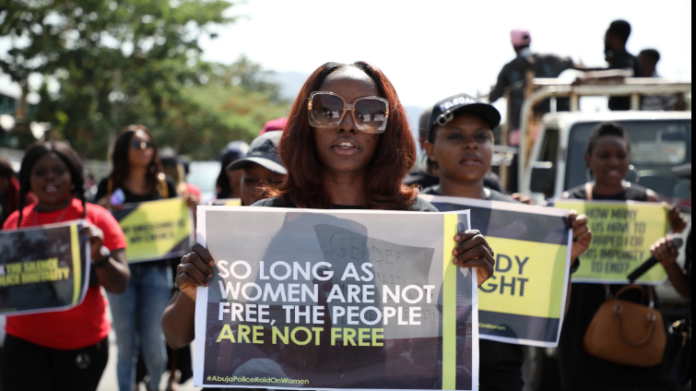In March 2022, Nigerian women suffered backlash in their pursuit of gender equity. Five gender bills presented to the National Assembly were thrown out.
The bills sought to advance women’s rights on a number of fronts. These included: providing special seats for women at the National Assembly; allocating 35% of political position appointments to women; creating 111 additional seats in the National Assembly and the state constituent assemblies; and a commitment to women having at least 10% of ministerial appointments.
The rejection of the bills showed that the assembly wasn’t interested in gender parity in politics. It has 469 members. Only 21 are women.
This is a tragedy for Nigerian women, whose representation in politics falls short of the goal set by the National Gender Policy in 2006. This policy demands that 35% of women be involved in all governance processes.
A weekly email with evidence-based analysis from Europe’s best scholars
Women make up about 49% of Nigeria’s population. Their representation in government is a far cry from what’s been achieved in other countries on the continent. For example, in Rwanda women make up 61.3% of members of parliament. In South Africa, they make up 46.5% of the country’s parliament.
Women played important roles in the struggle for independence. They wrote petitions, staged protests, mobilised and challenged all forms of oppression and suppression which permeated their economic, socio-cultural and political spaces. Also, during the years of military rule a significant number of Nigerian women stood their ground across governance strata, and spoke truth to power.
Since protracted military rule was ended in 1999, previously marginalised populations and segments of the country have gained the confidence to participate in governance. But the going has been slow for women.
As my research shows, there is only lip service commitment to gender mainstreaming across electoral processes in Nigeria. My study with David Enweremadu highlighted the lack of women’s representation in parliament, as well as among security personnel, party agents, media, observers and voters during electoral processes.
Warped media portrayal of women also contributes to the exclusion of women. The rejected gender and equal opportunity bill would have resolved this.
There are three main reasons for the exclusion of women.
Firstly, there’s a lack of voter education. Secondly, women are disproportionately excluded from policy making domains because more live in poverty than men. Thirdly, there is more moral scrutiny of women than men.
Lack of voter education
Women play various roles in elections. They act as cheerleaders at political rallies, run grassroots (often door-to-door) campaigns, organise protests against election misconduct, vie for political office and serve as political appointees, among others.
Yet most lack voter education. Voter education must take on gendered contexts. It must be conducted by bodies such as the Independent National Electoral Commission as well as civil society.
The role of poverty
Women constitute a larger proportion of poor people in the country.
This hampers gender equality in political representation because poverty denies women the financial and human resources required for leadership positions. The Independent National Electoral Commission’s Gender Policy, which provides specific measures to deal with women’s marginalisation in politics, should be revisited to ensure it’s implemented to the letter.
Corruption
Another tactic used to keep women out of politics is what I have termed “feminised corruption”. In a recent paper I showed how the level of corruption was perceived differently when women were involved compared to men.
The study observed that ethnicity, age, class and educational background are not necessarily contributory to how corruption is feminised in Nigeria. But being a woman in the political space is. This seems like a deliberate effort to weaponise corruption against women in politics and leadership.
A number of high ranking Nigerian women have been caught in this web. Among them are Patricia Etteh, first female speaker of the Federal House of Representatives, who was accused of unauthorised spending of 628 million naira (about $5m); Stella Oduah, former Minister of Aviation, indicted for alleged fraud of about five billion naira; Winifred Oyo-Ita, former Head of Service of the Federation, who was accused of 570 million naira fraud charges; Diezani Allison Madueke, former Minister of Petroleum Resources, who was accused of money laundering; Kemi Adeosun, former Minister of Finance, who was accused of certificate forgery; and Adenike Grange, former Minister of Health, indicted for allegedly stealing public funds.
Each of the indictments against these women has its peculiarities. But I argue they are connected by the fact that none of the cases has been brought to a legal conclusion. This is unusual and suspicious. Some corruption cases against men have been brought to legal conclusion.
On top of this, several corruption cases involving men have not been given as much attention as the cases involving women. And, in many cases, men indicted for corruption have escaped opprobrium and returned triumphantly to politics.
The reverse is true for female politicians who, once indicted for corruption, withdraw in shame and mostly never return to politics.
Besides, women in politics have to endure close scrutiny of their private lives. This includes shaming family members and objectifying women’s bodies by politicising personal items such as jewellery, shoes and bras.
What needs to be done
The three challenges to women’s political representation in Nigeria are not insurmountable.
Voter education must capture the global quest for gender parity and place it in local contexts.
Gender policies must be implemented and monitored.
Feminised poverty calls for interventions to reduce wealth disparities.
The abuse of women indicted for corruption must be nipped in the bud.
This article first appeared in The Conversation


